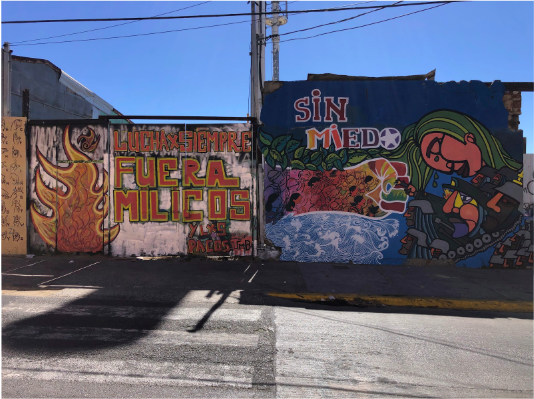Like many students studying abroad, we began our experience in Chile with the goal of improving our language skills. Over the last two weeks, however, we have gained an entirely new vocabulary that began to define our lives. Toque de queda, or curfew, meant that we were required to remain in our houses each night for a week. Estado de emergencia/excepción, or state of emergency or state of exception, meant that the military and police were to be deployed in the streets and normal laws would be suspended for fifteen days. Saqueo meant looting, which according to news media was an action delinquent protesters were guilty of committing. A cell phone video, however, depicted officers putting stolen televisions in the trunk of a police car. Cacerolazo is a form of protest where you bang a pot, pan or anything metal in the street, out of a window or wherever one finds themself. Balear, meant to shoot, was something we learned after hearing on the news that a young adult was shot in a peaceful protest in Viña del Mar.
According to “NPR,” the protests began on Oct. 6, when the Santiago metro fare was raised by four percent. In response, high schoolers organized a mass fare evasion campaign, hopping the turnstiles and eventually occupying the metro stations. The protests brewed for two weeks until Oct. 18, when the situation came to a head. Confrontations with police turned violent, with carabineros — or, police officers — beating, tear gassing and shooting rubber bullets at protestors. This began the state of emergency, which would be followed by the first curfew the next night. Over the weekend, the protests spread throughout the country; eventually the state of emergency and curfew were declared in several other regions, including our region of Valparaíso.
Although the subway fare rise was eventually reversed, the demonstrations grew to encompass multiple issues. The metro hike was just “la gota que rebalsó el vaso,” or the straw that broke the camel’s back. “No son 30 pesos, son 30 años,” became the movement’s anthem. This refrain refers to the past 30 years of harmful neoliberal policies introduced under the dictatorship of Augusto Pinochet, which produced some of the starkest economic inequality in all of Latin America. In Chile, police and military response to the protests has resulted in at least 18 people dead. Many more are injured or missing.
It is important to understand that these are not isolated or unique incidents in some distant, oppressive state. Similarly, domestic American institutions like police forces and federal agencies criminalize and enact violence upon Black and Indigenous people for expressing dissent, being in the “wrong place at the wrong time” or for simply existing. While the historical and actual contexts of these acts differ greatly in each country, it is impossible to ignore the parallels between the indiscriminately violent response by police and military to protests in Chile and the deployment of the National Guard in Ferguson.
As exchange students from the US, this time felt strange to say the least. When protestors took to the streets, we along with the other students in our abroad program were required to remain in our houses for safety and were explicitly forbidden from protesting. Days that had previously been filled with classes, beach trips and exploring the city now primarily included hours of skewed TV news, discussing the events with our host families and anxiously scrolling through social media for updates. Friends uploaded Instagram stories showing police attacking unarmed crowds and the burning of barricades, buildings and metro stations. Residual teargas lingered in the air, and for a full week our region smelled like smoke. Each night the clanging of pots and pans rang out through the city. During this time we met most of our neighbors — united in protest.
Though we were excited to be part of the dissent, we were and are immensely privileged. We are both enraged by the injustices and worried for our loved ones’ safety, but are ultimately unaffected by the metro fare increase, the inadequate pension plans and the ongoing theft of water by agricultural companies. Our experience in Chile highlights how studying abroad can be neo-colonial and exploitative; students get to “experience” or “learn from” different cultures without enduring any long-term consequences.
Our university classes have been suspended indefinitely, and our program has given us the option of remaining in Chile or returning home for the semester. Two of us have flown back to the States, and one of us is still in Chile taking program-run classes as Chilean students continue protesting. We are trying to support protestors primarily through spreading awareness and echoing their demands. Their fight is far from local and is part of a global struggle against systems of oppression. This week in New York City, people organized a mass fare-evasion on the subways, protesting the criminalization of poverty and heightened police presence and violence in stations; the videos of New York look just like those from Santiago only two weeks ago. Stickers with the slogan “Evade,” coincidentally the same word in English and Spanish, are seen stuck to the inside of the 1 train. Chile despertó, and it seems that the whole world is waking up too.




